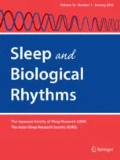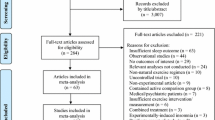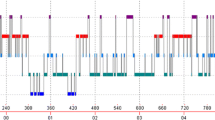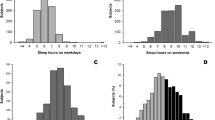Abstract
Purpose
The aim of this study was to investigate the sleep quality of spouses of patients with restless legs syndrome (RLS).
Methods
Total 49 spouses of patients with RLS (Group 1) and 47 age- and sex-matched healthy volunteers (Group 2) were enrolled. Sleep quality was assessed by Pittsburgh Sleep Quality Index (PSQI). Insomnia Severity Index (ISI), Epworth Sleepiness Scale (ESS), Beck Depression Inventory (BDI), and Beck Anxiety Inventory (BAI) were applied to all participants. High risk of the sleep apnea was excluded by Berlin Questionnaire. The RLS severity of patients was determined by International Restless Legs Syndrome rating scale.
Results
The mean age was 44.91 ± 12.81 in Group 1 (25 female, 24 male) and 41.48 ± 8.20 in Group 2 (25 female, 22 male). 35 (71.4%) participants in Group 1 and 20 (42.6%) participants in Group 2 had poor sleep quality (p = 0.004). Sleep quality was poor in 84% (n = 21) of female and 58.3% (n = 14) of male in Group 1 (p = 0.05). Sleep quality, insomnia and daytime sleepiness found to be correlated significantly with RLS severity (p < 0.05). Scores of BDI and BAI also correlated with PSQI (p = 0.002, p = 0.03). The significant relationship was observed between subjective sleep quality, sleep latency, and disease severity (p = 0.03, p = 0.005).
Conclusion
Restless legs syndrome may be a factor that may impair the quality of sleep in spouses of patients. Sleep quality is important in an individual's relationship with his / her health and spouse. In the treatment and follow-up of patients with RLS, their spouses should also be evaluated in this respect.

Similar content being viewed by others
References
Ohayon MM, O’Hara R, Vitiello MV. Epidemiology of restless legs syndrome: a synthesis of the literature. Sleep Med Rev. 2012;16:283–95.
Wijemanne S, Ondo W. Restless legs syndrome: clinical features, diagnosis and a practical approach to management. Pract Neurol. 2017;17(6):444–52.
Allen RP, Picchietti DL, Garcia-Borreguero D, Ondo WG, Walters AS, Winkelman JW, Zucconi M, Ferri R, Trenkwalder C, Lee HB; International Restless Legs Syndrome Study Group. Restless legs syndrome/Willis-Ekbom disease diagnostic criteria: updated International Restless Legs Syndrome Study Group (IRLSSG) consensus criteria—history, rationale, description, and significance. Sleep Med 2014;15:860–873.
Guo S, Huang J, Jiang H, Han C, Li J, Xu X, Zhang G, Lin Z, Xiong N, Wang T. Restless legs syndrome: from pathophysiology to clinical diagnosis and management. Front Aging Neurosci. 2017;9:171.
Stevens MS. Restless legs syndrome/Willis-Ekbom disease morbidity: burden, quality of life, cardiovascular aspects, and sleep. Sleep Med Clin. 2015;10(3):369–73.
Mohri I, Kato-Nishimura K, Tachibana N, Ozono K, Taniike M. Restless legs syndrome (RLS): an unrecognized cause for bedtime problems and insomnia in children. Sleep Med. 2008;9:701–2.
Trenkwalder C, Allen R, Högl B, Paulus W, Winkelmann J. Restless legs syndrome associated with major diseases: a systematic review and new concept. Neurology. 2016;86(14):1336–43.
Ondo W. Restless Legs Syndrome “Patient Odyssey” survey of disease burden on patient and spouses/partners. Sleep Med. 2018;47:51–3.
Del Rio João KA, de Jesus SN, Carmo C, Pinto P. Sleep quality components and mental health: study with a non-clinical population. Psychiatry Res. 2018;269:244–50. https://doi.org/10.1016/j.psychres.2018.08.020.
Cappuccio FP, D’Elia L, Strazzullo P, Miller MA. Quantity and quality of sleep and incidence of type 2 diabetes. Diabetes Care. 2010;33:414–20.
Grandner MA, Hale L, Moore M, Patel NP. Mortality associated with short sleep duration: the evidence, the possible mechanisms, and the future. Sleep Med Rev. 2010;14:191–203.
Walters AS, LeBrocq C, Dhar A, Hening W, Rosen R, Allen RP, Trenkwalder C; International Restless Legs Syndrome Study Group. International Restless Legs Syndrome Study Group. Validation of the International Restless Legs Syndrome Study Group rating scale for restless legs syndrome. Sleep Med 2003;4:121–132.
Abrishami A, Khajehdehi A, Chung F. A systematic review of screening questionnaires for obstructive sleep apnea. Can J Anaesth. 2010;57:423–38.
Agargun M. Pittsburgh uyku kalitesi indeksinin gecerligi ve guvenirligi. Turk Psikiyatri Dergisi. 1996;7:107–15.
Buysse DJ, Reynolds CF III, Monk TH, Berman SR, Kupfer DJ. The Pittsburgh sleep quality index: a new instrument for psychiatric practice and research. Psychiatry Res. 1989;28:193–213.
Chiu HY, Chang LY, Hsieh YJ, Tsai PS. A meta-analysis of diagnostic accuracy of three screening tools for insomnia. J Psychosom Res. 2016;87:85–92.
Bastien CH, Vallières A, Morin CM. Validation of the Insomnia Severity Index as an outcome measure for insomnia research. Sleep Med. 2001;2:297–307.
Boysan M, Güleç M, Beşiroğlu L, Kalafat T. Uykusuzluk Şiddeti İndeksi’nin Türk örneklemindeki psikometrik özellikleri. Anatolian J Psychiatry. 2010;11:248–52.
Johns MW. A new method for measuring daytime sleepiness: the Epworth sleepiness scale. Sleep. 1991;4:540–5.
Izci B, Ardic S, Firat H, Sahin A, Altinors M, Karacan I. Reliability and validity studies of the Turkish version of the Epworth Sleepiness Scale. Sleep Breath. 2008;12:161–8.
Beck AT, Ward CH, Mendelson M, Mock J, Erbaugh J. An inventory for measuring depression. Arch Gen Psychiatry. 1961;4:561–71.
Hisli N. Beck depresyon envanterinin gecerliligi uzerine bir calisma (a study on the validity of Beck depression inventory). Psikoloji Dergisi. 1988;6:118–22.
Beck AT, Epstein N, Brown G, Steer RA. An inventory for measuring clinical anxiety: psychometric properties. J Consult Clin Psychol. 1988;56(6):893–7.
Ulusoy M, Sahin NH, Erkmen H. The Beck anxiety inventory: psychometric properties. J Cogn Psychother. 1998;12:163–72.
Mong JA, Cusmano DM. Sex differences in sleep: impact of biological sex and sex steroids. Philos Trans R Soc Lond B Biol Sci. 2016;371:20150110.
Lee S, Martire LM, Damaske SA, Mogle JA, Zhaoyang R, Almeida DM, Buxton OM. Covariation in couples’ nightly sleep and gender differences. Sleep Health. 2018;4(2):201–8.
Holzknecht E, Hochleitner M, Wenning GK, Högl B, Stefani A. Gender differences in clinical, laboratory and polysomnographic features of restless legs syndrome. J Sleep Res. 2019;00:e12875.
Filip I, Tidman M, Saheba N, Bennett H, Wick B, Rouse N, Patriche D, Radfar A. Public health burden of sleep disorders: underreported problem. J Public Health. 2017;25:243–8.
Sutton EL. Psychiatric disorders and sleep issues. Med Clin North Am. 2014;98(5):1123–43.
O’Leary K, Bylsma LM, Rottenberg J. Why might poor sleep quality lead to depression? A role for emotion regulation. Cogn Emot. 2017;31:1698–706.
Inanç L, Altintas M, Semiz ÜB. Obsesif kompulsif bozuklukta uyku kalitesinin depresyon ve anksiyete ile iliskisi/the relation of sleep quality to depression and anxiety in obsessive compulsive disorder. J Turk Sleep Med. 2018;5:2–7.
Ramsawh HJ, Stein MB, Belik S-L, Jacobi F, Sareen J. Relationship of anxiety disorders, sleep quality, and functional impairment in a community sample. J Psychiatr Res. 2009;43:926–33.
Ferri R, Koo BB, Picchietti DL, Fulda S. Periodic leg movements during sleep: phenotype, neurophysiology, and clinical significance. Sleep Med. 2017;31:29–38.
Bogan RK. Effects of restless legs syndrome (RLS) on sleep. Neuropsychiatr Dis Treat. 2006;2:513–9.
Hamamcı M, Hacimusalar Y, Karaaslan O, İnan LE. Evaluation of sleep quality in spouses of people with epilepsy. Epilepsy Behav. 2019;94:233–8.
Funding
None.
Author information
Authors and Affiliations
Contributions
BS contributed in conception, data collection and manuscript drafting. MH contributed in conception design and data collection. UE contributed data collection and editing.
Corresponding author
Ethics declarations
Conflict of interest
None.
Additional information
Publisher's Note
Springer Nature remains neutral with regard to jurisdictional claims in published maps and institutional affiliations.
The study was approved by the university ethics committee (2017-KAEK-189_2019.05.29_08), and all participants provided written informed consent
Rights and permissions
About this article
Cite this article
Say, B., Hamamcı, M. & Ergün, U. Assessment of sleep quality in spouses of patients with restless legs syndrome; Are they also restless at night?. Sleep Biol. Rhythms 19, 113–119 (2021). https://doi.org/10.1007/s41105-020-00294-6
Received:
Accepted:
Published:
Issue Date:
DOI: https://doi.org/10.1007/s41105-020-00294-6




